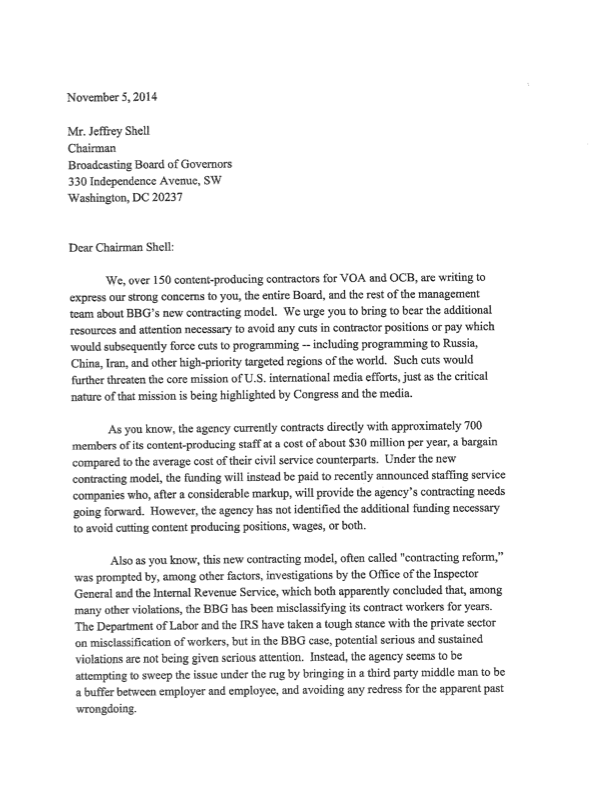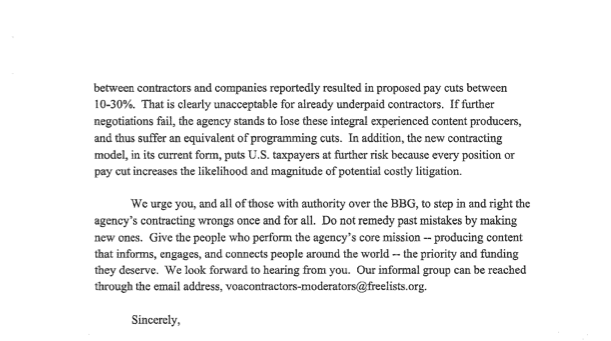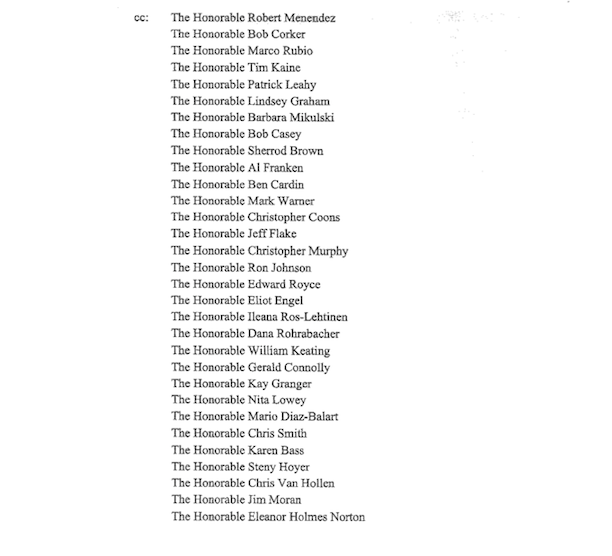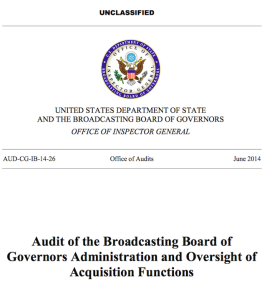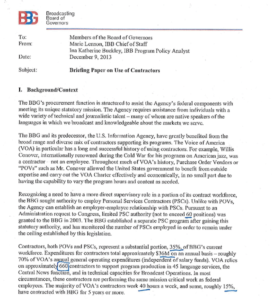BBG Watch Commentary
“Instead, the agency seems to be attempting to sweep the issue under the rug by bringing in a third party middle man to be a buffer between employer and employee, and avoiding any redress for the apparent past wrongdoing.” From a letter of Broadcasting Board of Governors (BBG) Voice of America (VOA) and Office of Cuba Broadcasting (OCB – Radio and TV Marti) media content-producing contract employees to BBG Chairman Jeff Shell and members of the U.S. Congress.
BBG Watch has reported on Joe Davidson‘s column in The Washington Post about the Voice of America contracting scandal. The Washington Post Federal Diary, a column about the federal workplace, mentioned BBG Watch reporting on VOA news and management failures.
SEE: Washington Post cites BBG Watch on poor news coverage and mismanagement at Voice of America, BBG Watch, November 23, 2014.
Today’s (Monday, November 24, 2014) expanded print and online version of Joe Davidson’s column includes a statement from Letitia King, a BBG spokeswoman, other new information, as well as a link to Office of the Inspector General (OIG) audit report and an internal memo by one of BBG’s International Broadcasting Bureau executives.
“We have to evaluate our programming relative to the human capital (employees and contractors) we can afford each year,” she said. “We remain committed to our goal of continuing to provide high-quality content to our audiences worldwide.” — BBG Spokesperson Letitia King
SEE: Washington Post expanded column offers new details on Voice of America contracting scandal, BBG Watch, November 24, 2014.
The BBG was cited by the Office of the Inspector General (OIG) as non-compliant with Federal Acquisition Regulations (FAR) and in violation of the Anti-Deficiency Act (ADA).
The bipartisan bill to reform the BBG, H.R. 4490 (passed by the House of Representatives and awaiting further legislative action by the Senate), notes these problems in sec.2 (“Findings and Declarations”) and requires the CEO of USICA (a new agency proposed in the legislation) to annually submit a report on the agency’s compliance with both FAR and ADA in sec. 112(b).
“(11) According to the Office of the Inspector General, the BBG’s Office of Contracts is not in compliance with the Federal Acquisition Regulation, lacks appropriate contract oversight, and violates the Anti-Deficiency Act. The Office of the Inspector General also determined that the Broadcasting Board of Governors has not adequately performed full and open competitions or price determinations, has entered into hundreds of personal service contracts without statutory authority, and contractors regularly work without valid contracts in place.”
“15) The annual survey conducted by the ‘Partnership for Public Service’ consistently ranks the Broadcasting Board of Governors at or near the bottom of all Federal agencies in terms of ‘overall best places to work’ and ‘the extent to which employees feel their skills and talents are used effectively’. The consistency of these low scores point to structural, cultural, and functional problems at the Broadcasting Board of Governors.”
“17) The Broadcasting Board of Governors has an overabundance of senior civil service positions, defined here as full-time employees encumbering GS-14 and GS-15 positions on the General Schedule pay scale.”
“20) Congressional action is necessary at this time to improve international broadcasting operations, strengthen the United States public diplomacy efforts, enhance the grantee surrogate broadcasting effort, restore focus to news, programming, and content, and maximize the value of Federal and non-Federal resources that are dedicated to public diplomacy and international broadcasting.” — Full text of H.R. 4490 – Suspension Text
The following is the text of the letter sent by BBG’s VOA and OCB contractors to BBG Chairman Jeff Shell and members of the U.S. Congress.
November 5, 2014
Mr. Jeffrey Shell
Chairman
Broadcasting Board of Governors
330 Independence Avenue, SW
Washington, DC 20237Dear Chairman Shell:
We, over 150 content-producing contractors for VOA and OCB, are writing to express our strong concerns to you, the entire Board, and the rest of the management team about BBG’s new contracting model. We urge you to bring to bear the additional resources and attention necessary to avoid any cuts in contractor positions or pay which would subsequently force cuts to programming — including prograrmning to Russia, China, Iran, and other high-priority targeted regions of the world. Such cuts would further threaten the core mission of U.S. international media efforts, just as the critical nature of that mission is being highlighted by Congress and the media.
As you know, the agency currently contracts directly with approximately 700 members of its content-producing staff at a cost of about $30 million per year, a bargain compared to the average cost of their civil service counterparts. Under the new contracting model, the funding will instead be paid to recently announced staffing service companies who, after a considerable markup, will provide the agency’s contracting needs going forward. However, the agency has not identified the additional funding necessary to avoid cutting content producing positions, wages, or both.
Also as you know, this new contracting model, often called “contracting reform,” was prompted by, among other factors, investigations by the Office of the Inspector General and the Internal Revenue Service, which both apparently concluded that, among many other violations, the BBG has been misclassifying its contract workers for years. The Department of Labor and the IRS have taken a tough stance with the private sector on misclassification of workers, but in the BBG case, potential serious and sustained violations are not being given serious attention. Instead, the agency seems to be attempting to sweep the issue under the rug by bringing in a third party middle man to be a buffer between employer and employee, and avoiding any redress for the apparent past wrongdoing.
In total, the new model, in its current form, is the wrong path for the the agency, the contractors, and the U.S. taxpayers.
Bad for BBG
Let’s be clear — every position potentially on the chopping block through this process is involved in content production — the core of the Agency’s mission. They are producers, writers, language experts, camera operators, video editors, graphic artists, etc. Contractors make up around 40% of the entire VOA workforce, an even higher percentage of VOA’s content-producing workforce, and a still higher percentage of the content-producing workforce of some key language services like the Persian service. It is our understanding that every program VOA produces goes through the hands of at least one contractor. Conversely, every contract position not involved in production of content administrative, bureaucratic, IT, transmission, distribution, or other support services — has been exempted from this process. The Agency has been criticized by the sponsors of pending BBG reform legislation, and others, for protecting bureaucratic jobs at the cost of programming. The Agency should avoid adding more fuel to that fire through flawed contracting changes that could cut content production.
Bad for Contractors
Let’s be clear — this isn’t a Halliburton or a $600 toilet seat kind of contracting situation. Nearly all of these 700 contractors make less than market rates, and receive raises in their rates rarely, if ever. Many have been working for the BBG for years, and are at least as dedicated to the mission as any of the agency’s federal employees. But they make less than their civil service counterparts, and receive no benefits, despite doing the same jobs with the same job titles at the same times in the same ways with the same supervision. Many of them are foreign-born journalists and producers, some of whom rely on BBG for J-1 visas, who are happy to be making a living doing the important work of the agency. Yet, under the new contracting model, it is these dedicated contractors — and not any of those responsible for the agency’s acquisition decisions — who will pay the price for the agency’s apparent mistakes.
Bad for Taxpayers
Let’s be clear — the U.S. taxpayers have invested, at bargain prices, in these content-producing contractors. The agency acknowledges that they cannot afford to lose out on that investment, and have made some attempts to keep current contractors in place under the new model. However, those attempts have fallen short, even with a slight increase in funding, for the first round transition of high priority divisions, potentially putting programming to Russia, Ukraine, and parts of Africa at risk. The agency has apparently avoided outright position cuts during this first round, but initial negotiations between contractors and companies reportedly resulted in proposed pay cuts between 10-30%. That is clearly unacceptable for already underpaid contractors. If further negotiations fail, the agency stands to lose these integral experienced content producers, and thus suffer an equivalent of programming cuts. In addition, the new contracting model, in its current form, puts U.S. taxpayers at further risk because every position or pay cut increases the likelihood and magnitude of potential costly litigation.
We urge you, and all of those with authority over the BBG, to step in and right the agency’s contracting wrongs once and for all. Do not remedy past mistakes by making new ones. Give the people who perform the agency’s core mission — producing content that informs, engages, and connects people around the world — the priority and funding they deserve. We look forward to hearing from you. Our informal group can be reached through the email address, voacontractors-moderators@freelists.org.
Sincerely,
[Signatures] cc:The Honorable Robert Menendez
The Honorable Bob Corker
The Honorable Marco Rubio
The Honorable Tim Kaine
The Honorable Patrick Leahy
The Honorable Lindsey Graham
The Honorable Barbara Mikulski
The Honorable Bob Casey
The Honorable Sherrod Brown
The Honorable Al Franken
The Honorable Ben Cardin
The Honorable Mark Warner
The Honorable Christopher Coons
The Honorable Jeff Flake
The Honorable Christopher Murphy
The Honorable Ron Johnson
The Honorable Edward Royce
The Honorable Eliot Engel
The Honorable Ileana Ros-Lehtinen
The Honorable Dana Rohrabacher
The Honorable William Keating
The Honorable Gerald Connolly
The Honorable Kay Granger
The Honorable Nita Lowey
The Honorable Mario Diaz-Balart
The Honorable Chris Smith
The Honorable Karen Bass
The Honorable Stony Hoyer
The Honorable Chris Van Hollen
The Honorable Jim Moran
The Honorable Eleanor Holmes Norton
###
The Washington Post column by Joe Davidson provides links to U.S. Government’s Office of Inspector General document and an internal BBG memo to illustrate the story, as well as links to BBG Watch.
Just last week it [BBG] began compensating people who were improperly fired in 2009 from the anachronistic Office of Cuba Broadcasting. Its [Voice of America’s] election night coverage three weeks ago was the target of derisive comments on BBG Watch , an online publication by current and former employees. Year after year, including this one, the BBG is a loser on key employee survey questions.
